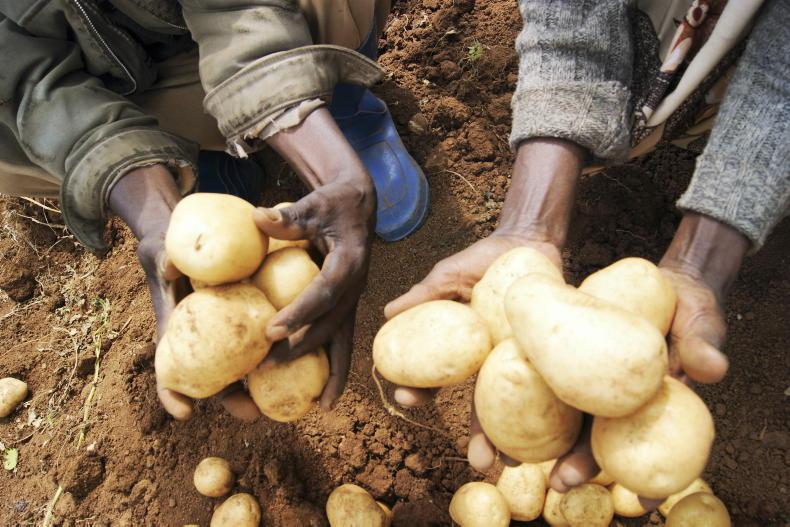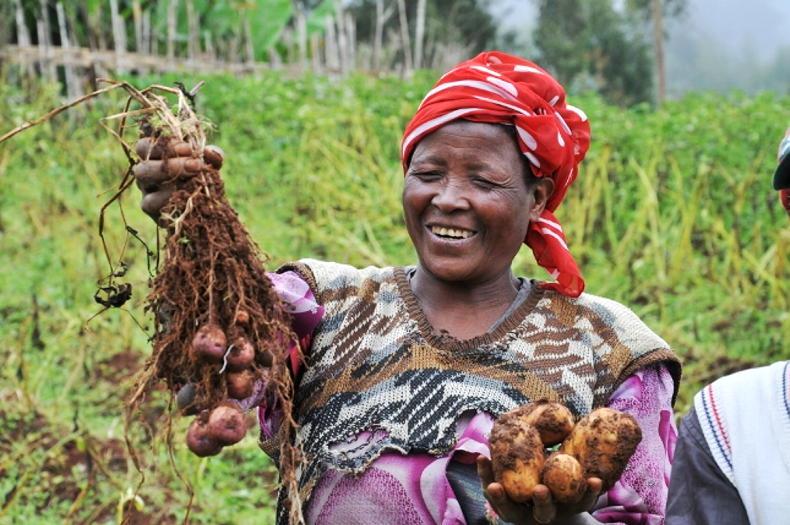The Irish development charity Vita has helped to increase the potato yields of east African smallholders by more than 300% with the help of the Irish potato industry, head of the charity’s programmes John Gilliland told the Irish Farmers Journal.
Vita puts an emphasis on high-quality, disease-free seed potatoes when working with small-scale farmers to improve yields in the uplands of Ethiopia and Eritrea.
Gilliland described the smallholdings it seeks to improve as having cropping practices similar to those employed here in the “1920s or 1930s” with levels of mechanisation remaining low.
“The small farmers we are dealing with generally have a bit of everything. A goat or two, some chickens, highland maize and some cereals on the relatively lower land,” the charity boss commented to the Irish Farmers Journal.
“There are no powered vehicles at all to do farm work.”

Clean, high quality seed potatoes are the starting point when improving yields, the charity maintains. / Vita
Boosting yields
Potato yields rose from average of around 8t/ha to 25t/ha on the farms that have worked with Vita, according to Gilliland.
“The potential of potatoes is huge. The yields far outweigh anything that can be achieved with cereals.
“They can reduce the hungry months when food stores run low from six to only one or two months.”
The Irish Potato Federation and Teagasc have both been involved in improving potato management on farms with Vita.
“Teagasc is a technical partner and we do have support from the Irish potato sector, both financially and by getting growers out to act as mentors.”
Essential to maintaining the higher yield potential brought about by using quality seed is crop rotation, which is taught to farmers as a means of lowering the hit pests and diseases have on output.

A comparison of native and improved seed potatoes on a small Ethiopian farm. / Vita
Lasting impact
Gilliland stated that having an exit strategy is key to Vita’s work having a lasting impact in the African regions in which it works.
“Africa is littered with failed seed potato projects where seed has been bought and then after three or four years, the seed is back to where it began,” he went on.
“You need to set up seed co-operatives, to have five to 10 farmers working together to produce their own seed so they can sustain themselves.”
Doing so can allow these farmers to operate at higher yields having learned best practice, rather than remaining fully dependant on an external supply of quality seed, he maintains.
“These mini co-ops are left behind and we can move on to work in a new area.”
Vita said that it is looking to build “scalable models” of seed potato cultivation into the future.
The Irish development charity Vita has helped to increase the potato yields of east African smallholders by more than 300% with the help of the Irish potato industry, head of the charity’s programmes John Gilliland told the Irish Farmers Journal.
Vita puts an emphasis on high-quality, disease-free seed potatoes when working with small-scale farmers to improve yields in the uplands of Ethiopia and Eritrea.
Gilliland described the smallholdings it seeks to improve as having cropping practices similar to those employed here in the “1920s or 1930s” with levels of mechanisation remaining low.
“The small farmers we are dealing with generally have a bit of everything. A goat or two, some chickens, highland maize and some cereals on the relatively lower land,” the charity boss commented to the Irish Farmers Journal.
“There are no powered vehicles at all to do farm work.”

Clean, high quality seed potatoes are the starting point when improving yields, the charity maintains. / Vita
Boosting yields
Potato yields rose from average of around 8t/ha to 25t/ha on the farms that have worked with Vita, according to Gilliland.
“The potential of potatoes is huge. The yields far outweigh anything that can be achieved with cereals.
“They can reduce the hungry months when food stores run low from six to only one or two months.”
The Irish Potato Federation and Teagasc have both been involved in improving potato management on farms with Vita.
“Teagasc is a technical partner and we do have support from the Irish potato sector, both financially and by getting growers out to act as mentors.”
Essential to maintaining the higher yield potential brought about by using quality seed is crop rotation, which is taught to farmers as a means of lowering the hit pests and diseases have on output.

A comparison of native and improved seed potatoes on a small Ethiopian farm. / Vita
Lasting impact
Gilliland stated that having an exit strategy is key to Vita’s work having a lasting impact in the African regions in which it works.
“Africa is littered with failed seed potato projects where seed has been bought and then after three or four years, the seed is back to where it began,” he went on.
“You need to set up seed co-operatives, to have five to 10 farmers working together to produce their own seed so they can sustain themselves.”
Doing so can allow these farmers to operate at higher yields having learned best practice, rather than remaining fully dependant on an external supply of quality seed, he maintains.
“These mini co-ops are left behind and we can move on to work in a new area.”
Vita said that it is looking to build “scalable models” of seed potato cultivation into the future.








 This is a subscriber-only article
This is a subscriber-only article












SHARING OPTIONS: